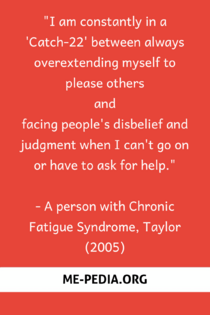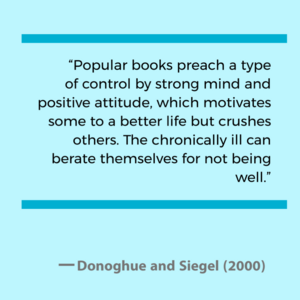Chronic illness

Chronic illness refers to any long-term illness, regardless of the severity.[1] Chronic illnesses are very common, affecting 6 in 10 Americans.[2]
Chronic illnesses may have gradual onset, and can be either progressive, or have a more stable course.[1]
Chronic compared to acute illness[edit | edit source]
Unlike chronic illnesses, acute illnesses are characterized by their sudden onset and short duration.[3]
Treatments and searching for a cure[edit | edit source]
Chronic illnesses, by definition, do not have a quick treatment or cure.[4]
The seductive message of having control over their illness can doom the chronically ill to a constant quest for a cure with the right diet and exercise, the right answers. Hopelessness and more guilt is often the sad conclusion to such a search.
―Sick and Tired of Feeling Sick and Tired: Living with Invisible Chronic Illness, Donoghue and Siegel (2000)

Invisible illnesses[edit | edit source]
Most chronic illness are invisible illnesses.[5] [6]:19
Notable studies[edit | edit source]
- 2020, Energy Impairment and Disability Inclusion: Towards an Advocacy Movement for Energy Limiting Chronic Illness.[7] (Full text)
See also[edit | edit source]
Learn more[edit | edit source]
- Chronic disease - CDC
References[edit | edit source]
- ↑ 1.0 1.1 "Definition of CHRONIC". Merrian-Webster Medical Dictionary. Retrieved November 29, 2021.
- ↑ "Chronic disease". Centers for Disease Control and Prevention.
- ↑ "Definition of ACUTE". Merrian-Webster Medical Dictionary. Retrieved November 29, 2021.
- ↑ Donoghue, Paul J.; Siegel, Mary E. (September 17, 2000). Sick and Tired of Feeling Sick and Tired: Living with Invisible Chronic Illness. W.W. Norton & Company. ISBN 978-0-393-34283-3.
- ↑ Taylor, Renee R. (September 1, 2005). "Can the Social Model Explain All of Disability Experience? Perspectives of Persons With Chronic Fatigue Syndrome" (PDF). The American Journal of Occupational Therapy. 59 (5): 497–506. doi:10.5014/ajot.59.5.497. ISSN 0272-9490.
- ↑ Arroll, Megan A. (September 18, 2014). Invisible Illness: Coping with misunderstood conditions. SPCK. ISBN 978-1-84709-306-6.
- ↑ Hale, Catherine; Benstead, Stef; Lyus, Jenny; Odell, Evan; Ruddock, Anna (2020). Energy Impairment and Disability Inclusion: Towards an Advocacy Movement for Energy Limiting Chronic Illness (PDF). Centre for Welfare Reform. ISBN 978-1-912712-25-0.

